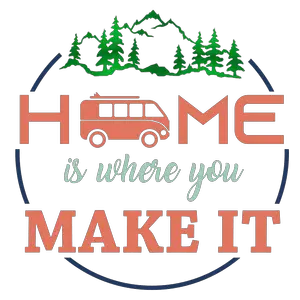Hey! This site is reader-supported and we earn commissions if you purchase products from retailers after clicking on a link from our site.
One of the things you’ll quickly come to realize when traveling in your RV is how often you will come to miss working in your own home kitchen or the one you left behind when you decided to become a full-time RVer. Good planning and learning how to utilize the limited space within your RV kitchen are essential when taking your RV out for long periods of time and even when you are just going on shorter excursions such as a long weekend or a week or two at a time.
Use your limited space wisely
The two main factors to consider when cooking in your RV are space and meal planning with the latter being especially important for those with limited space found most often in smaller campers or class B motorhomes and campervans. Small appliances such as food processors, espresso machines, or stand-up mixers are simply not practical when traveling and even if you do find space for them in a storage compartment or cupboard while they’re not in use, it’s likely you’ll tire very quickly of constantly retrieving them and then stowing them away again after their occasional use.
Bring what’s important to you
That’s not to say that you shouldn’t bring some of these items along with you if they are important to you and you plan on using them often, but you really should take a good look at how often you will use them and whether not having them available will affect your happiness when traveling. For example, I have met several couples on the road that love to drink cappuccino, espresso and fine coffee blends, so that made bringing a good coffee grinder and espresso machine with them an absolute must. While I like a good cup of coffee in the morning which I brew in a $2 steel percolator coffee pot I purchased at a thrift store, the thought of having an expensive coffee maker seemed rather extravagant to me. However, after I talked with these folks about their love of coffee, it didn’t seem so outrageous to me after all.
Related: RV kitchen checklist for departure
In fact, one couple went to on explain, “We love our coffees and espressos. We have espressos in the morning, cappuccinos in the afternoon and often we have one or the other after dinner every day. Sure, we could go to a Starbucks or a local coffee shop for these treats, but at five or six dollars apiece, that’s $30 a day. It just made more sense to buy a good coffee machine and save that money for other fun stuff to do.”
Another couple I met one time loved fresh baked bread. They found that having a bread maker was a must for when they traveled. So again, if an item makes you happy and you feel that not having with you will impede on that happiness then take it with you and enjoy yourself.
For example, I like toasted fresh vegetable sandwiches and I like to use a small toaster oven to make those. So, I eliminated my conventional toaster and now only use the toaster oven. I also find that these are great for heating up small casseroles or making meatloaf in them. They cut down on the heat that a conventional oven produces and if you’re staying in a campground where electric is included then you are not only saving propane from regular oven use but using a toaster oven isn’t costing you any money for electric. Another small appliance I always have on hand is a crock-pot and I will explain some of the benefits of having this appliance with me all the time later in this article when I touch on meal planning and preparation.
Besides the small appliances, what are some other ways to utilize my limited space?
Regardless of the type of RV you own, kitchen countertop space is always a commodity. I have a very roomy 5th wheel, but I still have a need for more counter space. One thing I did was install a pull-out cutting board from one of my lower cabinets. While this did supply a little bit more temporary space for food preparation, it still did not solve a lot of my problems with counter space and this is just something I have learned to deal with.
If you you’re like me and don’t care to open canned goods with a hand cranked can opener, consider purchasing cans that have pull tops or install an under-cabinet electric can opener. Not only does this save countertop space but it also eliminates the need to stow away a conventional electric countertop model every time you are traveling down the highway.
The magic of teacup hooks
Teacup hooks are a great thing to use in any RV. I have a small pantry cupboard in my rig and on the inside of that cupboard door I installed numerous teacup hooks to hang utensils such as large spoon, spatulas and whisks on. I also use them to hang potholders and since I buy hand towels that have gromets in them I hang those there too.
Get creative!
The real trick is to be creative. If you feel your life would be easier or you’d be happier if you had a certain cooking utensil or small appliance with you, find a way to make it happen. Fellow campers are a great source of information so don’t be afraid to ask other how they save countertop space or use their space to include the items you may both like utilize.
Now let’s talk about meal planning
I’m not a big fan of planning my menus out in advance, but for those that are traveling with a family this is often the route they choose to take. If you want help meal planning, here are some great online tools to help you out.
For me, I just don’t want to sit down with a calendar and plan out what I’m going to eat for breakfast, lunch and dinner three Tuesdays from now. First, I don’t have the time and second, I prefer to purchase most of my meats, seafoods, fruit and vegetable at places like fresh markets and roadside stands when I can. For example, I love fresh seafood and if I’m at a butcher shop or seafood market in some coastal area, I’m going to purchase some of those foods I like and either freeze some of them for later use or eat them immediately that day or so.
Sometimes I purchase fresh food for long term use. An example of this is hard squash such as acorn, buttercup and butternut. Have you ever priced a good size butternut squash at a grocery store around the holiday season? Sometimes those vegetables are priced at $1.29 a pound and they weigh five pounds. There are places in the Midwest or Great Lakes area where farmers still have an unmanned roadside vegetable stand on the honor system where you can buy a bushel basket of these delicious vegetables for as little as five dollars and you leave that in the coffee can and move on. I buy these almost every year and if I keep them in a cool dry place they will last for several months.
Research local food stores
I also like to know what food stores are in my area besides the usual Walmart which I really strive to avoid at all costs. Yes, I will shop at Walmart, but I really prefer to give my business to smaller businesses or regional grocery chains such as Winn-Dixie, Kroger or Wegman’s. Given that, I prefer to look these stores up online at look at their current sales flyers and I usually find that their meats and seafoods may be a little higher in price, they are usually fresh cut and of higher quality.
One thing I will do when I’m staying in a campground for a week or two is get some of my staples such as canned goods, flours or grains, dried beans, dog food, and other supplies shipped to my location if I can do that at that campground. For more information about receiving mail and packages at campgrounds, please see an earlier article where I shared how I utilize that to save my time and shopping trips.
What about food preparation?
When it comes to food preparation, this is where I do most of my menu planning.
Prepare for leftovers
I like to prepare larger amounts of food at one time to save time later. Quite often I will cut up more onion or vegetables than I need for that day’s dinner I am preparing. I will also cook up several hamburgers on the grill and save them for later. Cooking outdoors is another way to save space and you can grill several components for several meals in advance. Here are our recommendations for the best RV grills.
Slow cookers for one pot meals
This brings me back to the slow cooker or crock-pot I mentioned earlier. I prefer not to cook meals every day. Instead, I will often cook a crock-pot of a good stew, soup or beef roast and eat this for a day or two. This also works well if you are work camping and you need to bring a lunch to work or even if you are planning a long hike or day away from your RV. Cook several hamburgers on the outdoor BBQ grill and then turn the leftovers into a nice crock-pot chili after a day or two. You can do this with chicken and pork as well.
Final words
Sometimes when it comes to food preparation, the best plan to have is “off the cuff”. Buy fresh, cook what works for you and makes you happy, and just enjoy what the road has to offer. Until next time, stay safe and I hope to see out there sometime.




